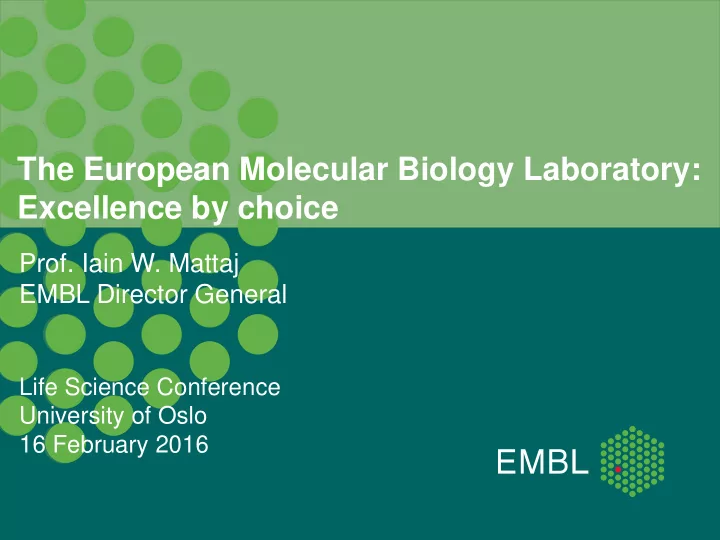

The European Molecular Biology Laboratory: Excellence by choice Prof. Iain W. Mattaj EMBL Director General Life Science Conference University of Oslo 16 February 2016
EMBL: promoting excellence for over 40 years • EMBL was founded in 1974, as European Intergovernmental Research Organisation, following the CERN model, to create a centre of excellence for molecular biology research in Europe • Former Directors General John Kendrew Lennart Philipson Fotis C. Kafatos Nobel Prize in Chemistry 1962 • Many award winning scientists Christiane Nüsslein-Volhard & Eric F. Wieschaus Nobel Prize in Medicine 1995
EMBL member states Member States (21) Austria 1974 Switzerland 1974 Ireland 2003 Denmark 1974 United Kingdom 1974 Iceland 2005 France 1974 Finland 1984 Croatia 2006 Germany 1974 Greece 1984 Luxembourg 2007 Israel 1974 Norway 1985 Czech Republic 2014 Italy 1974 Spain 1986 Netherlands 1974 Belgium 1990 Sweden 1974 Portugal 1998 Associate Member States Australia 2008 Argentina 2014 Prospect Member States Slovakia 2014 Hungary 2014 Poland 2014 Lithuania 2015
EMBL’s missions Technology Development Services & Transfer Basic Research Integration of life science Advanced research Training
Organisational principles: The EMBL model • ‘Hire the best’ • focus on young scientists • complete scientific independence • Stringent quality control • Scientific Advisory Committee • Adaptability & flexibility • continuous turnover • international (> 80 nationalities) • Financial, intellectual and technical support • mentoring • creativity & scientific freedom • open & collaborative culture • non-bureaucratic & efficient processes/systems • focus on research, few other tasks (e.g. teaching)
Motors for scientific excellence at EMBL • Interdisciplinary expertise & collaboration Modelling Physics Computational Biol Chemistry Medicine • Cutting-edge infrastructure & innovative technology development
Interdisciplinary collaboration at EMBL 2012-2014 8
Scientific publications in collaboration 2012-2014 75% of EMBL’s publications were published jointly with more than 800 institutions worldwide
Scientific excellence at EMBL 650 publications/year on average 40% of EMBL’s publications in the top 5% of journals in biochemistry, genetics and molecular biology 4 EMBL publications in the top 100 highest cited papers ever Overall quality of its publications places EMBL in the top 10 research institutions worldwide ~ 30% of EMBL’s research group leaders hold ERC awards
Promoting excellence for the future Bridging scales & The BIG data challenge resolutions Towards human biology & molecular medicine
World-leading infrastructures and services promote scientific excellence • generate scientific breakthroughs • attract talent & provide optimal working conditions for researchers • training of young scientists • development of new technologies and innovation
EMBL infrastructure and services Structural Biology ~ 2,500 user visits per year many users of complementary services Bioinformatics at EMBL-EBI > 11,000,000 web visits per day Core Facilities > 1,200 internal and external users per year
The EMBL model for research infrastructures and services • Close interaction with the scientific community • research collaborations • user feedback • Stringent review • Scientific Advisory Committee • Rapidly adapting to changing landscape • scientific needs • new technologies
Excellence through innovation: Technology development & transfer EMBL develops a broad spectrum of technology and instrumentation for life science research • Cross-fertilisation between research activities and technology development Imaging Software Synchrotron technology development instrumentation • Economic impact
Technology transfer The scientific community and society at large benefit from EMBL’s technology development and research discoveries SPIM microscopy Licensing EMBL Discovery or Protection Idea Invention Start-up company EMBL Technology Fund >170 patents granted ~ 2800 license & collaboration agreements 17 spin-outs
Promoting excellence at EMBL: Internal training EMBL International PhD Programme • Joint PhD degree with 25 universities in 17 countries • ~ 240 students from over 40 countries Postdoctoral programmes • Classical postdoctoral scheme • EMBL Interdisciplinary Postdocs (EIPODs) • EMBL Sanger Postdocs (ESPODs) • EMBL-EBI BRC* Postdocs (EBPOD) (*BRC: NIHR Cambridge Biomedical Research Centre)
Promoting excellence beyond EMBL: External training 2014 • Courses and conference programme across all five EMBL sites • 22 conferences and 43 courses • > 6000 participants from > 80 countries • 147 CPP fellowships and/or travel grants • Off-site training (mainly by EMBL-EBI staff) • ~ 150 training events • Online bioinformatics training at EMBL-EBI • 90 online courses with > 130k unique users • Visitors’ Programme • > 500 visitors/year
Exporting the EMBL model: EMBL Partnerships • Close cooperative affiliation with national institutions in EMBL member states • Establish network of international centres of scientific excellence and advanced training modelled on EMBL • Exploit complementarity or synergy • Transfer know-how
EMBL Partnership in Marine Molecular Biology with the Sars Centre Promoting scientific exchange and collaboration in basic research on marine organisms and the study of animal evolution • Focus on study of animal evolution and establishment/use of marine model organisms • Established in 2003 • Renewal of partnership agreement for ten years in 2015
The Nordic EMBL Partnership for Molecular Medicine Fostering translational research and promoting exchange of expertise in basic and clinical research • 2007 – partnership initiated between University of Oslo, Umeå University, University of Helsinki and EMBL • 2013 – renewal of partnership agreement for 10 years and opening of Danish node at Aarhus University Centre for Molecular Medicine Norway Laboratory for Molecular Infection Medicine Sweden Institute for Molecular Medicine Finland Danish Research Institute of Translational Neuroscience > 25 research group leaders have been recruited to the Nordic EMBL Partnership Nodes using the EMBL model since 2007
Thank you!
Recommend
More recommend